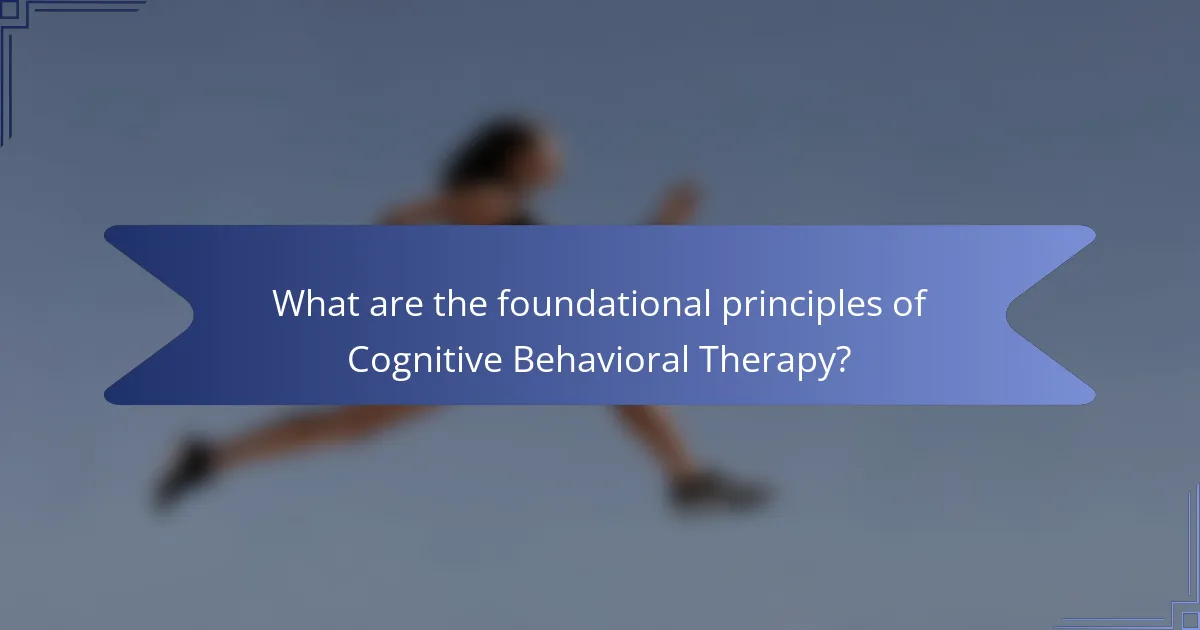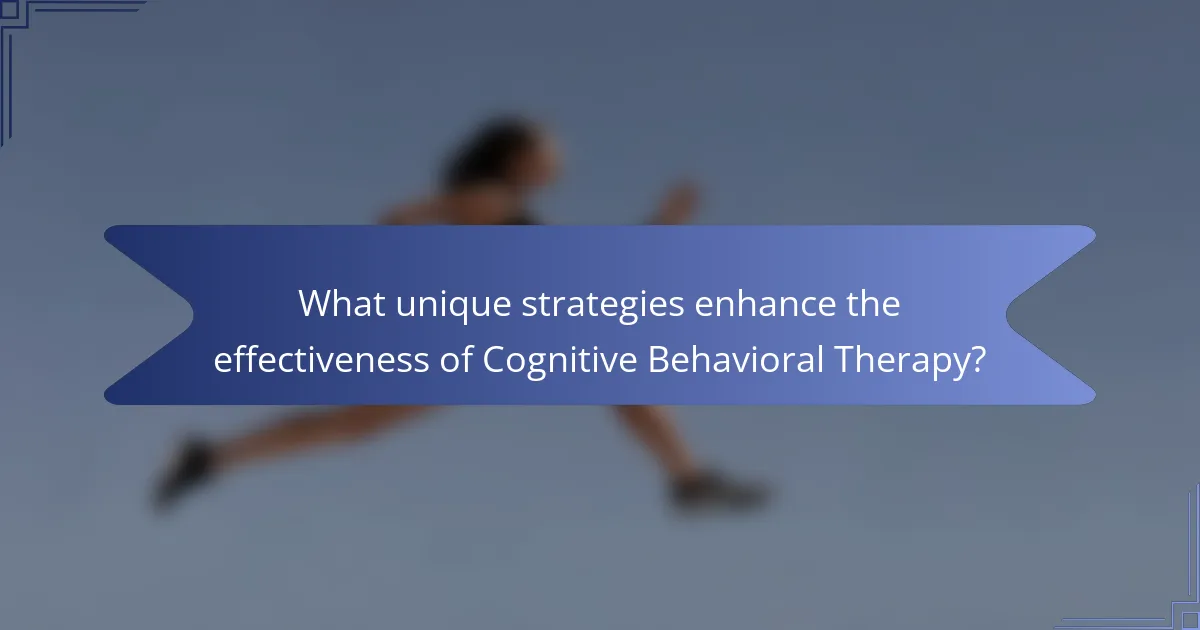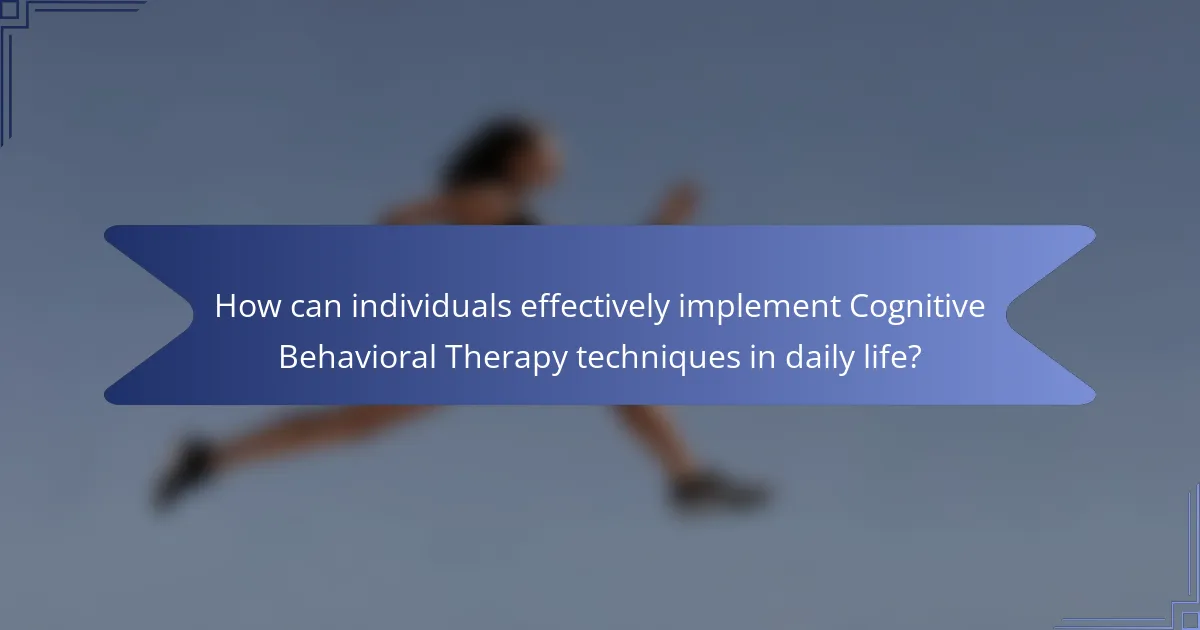Cognitive Behavioral Therapy (CBT) techniques provide practical strategies for personal growth and emotional regulation. These methods promote self-awareness, improve coping skills, and enhance interpersonal relationships. Unique approaches like mindfulness integration, cognitive restructuring, and behavioral activation deepen self-awareness and foster lasting change. Additionally, rare techniques such as imagery rescripting and schema therapy offer profound insights into personal development.

What are the foundational principles of Cognitive Behavioral Therapy?
Cognitive Behavioral Therapy (CBT) is based on principles that focus on the interplay between thoughts, feelings, and behaviors. These foundational principles include cognitive restructuring, which involves identifying and challenging negative thought patterns; behavioral activation, which encourages engagement in positive activities; and exposure therapy, designed to reduce fear and avoidance through gradual exposure. Each principle aims to empower individuals by providing practical strategies for personal growth and emotional regulation.
How does Cognitive Behavioral Therapy differ from other therapeutic approaches?
Cognitive Behavioral Therapy (CBT) focuses on changing negative thought patterns, unlike other therapies that may explore underlying issues. CBT is structured, goal-oriented, and evidence-based, emphasizing practical strategies for personal growth. Other approaches, such as psychodynamic therapy, delve into past experiences and emotions, which may not directly address current behaviors. CBT is typically shorter in duration, often lasting 12 to 20 sessions, making it a more time-efficient option for many individuals.
What are the core techniques used in Cognitive Behavioral Therapy?
Cognitive Behavioral Therapy employs several core techniques to foster personal growth. These techniques include cognitive restructuring, exposure therapy, behavioral activation, and mindfulness practices.
Cognitive restructuring helps individuals identify and challenge negative thought patterns, promoting healthier thinking. Exposure therapy gradually exposes clients to anxiety-provoking situations, reducing fear responses over time. Behavioral activation encourages engagement in meaningful activities to combat depression. Mindfulness practices enhance self-awareness and emotional regulation, allowing for better coping strategies.
These techniques collectively support personal development and improved mental well-being.
How can thought records be utilized for personal growth?
Thought records can enhance personal growth by identifying cognitive distortions and fostering self-awareness. They allow individuals to analyze thoughts, emotions, and behaviors systematically. This technique promotes reflection and encourages healthier thinking patterns. As a result, users can develop actionable strategies to address negative beliefs and improve overall mental well-being. Regular practice leads to greater emotional resilience and personal insight, contributing to long-term growth.
What role do cognitive distortions play in personal development?
Cognitive distortions significantly hinder personal development by fostering negative thinking patterns. These distortions, such as all-or-nothing thinking and overgeneralization, can lead to decreased motivation and self-esteem. Identifying and challenging these cognitive distortions is essential for personal growth. Cognitive Behavioral Therapy (CBT) techniques provide practical strategies to reframe thoughts, enabling individuals to cultivate a more positive mindset and enhance their overall well-being. By addressing these distortions, individuals can unlock their potential and achieve meaningful personal development.
How can behavioral activation enhance motivation?
Behavioral activation enhances motivation by encouraging engagement in meaningful activities. This technique helps individuals break the cycle of avoidance and inactivity, leading to increased feelings of accomplishment and purpose. By systematically identifying and scheduling enjoyable or fulfilling tasks, individuals can experience a boost in mood and motivation. Research shows that consistent practice of behavioral activation can lead to significant improvements in overall motivation levels and personal growth.

What are the universal benefits of Cognitive Behavioral Therapy techniques?
Cognitive Behavioral Therapy (CBT) techniques offer universal benefits that enhance personal growth. They promote self-awareness, improve emotional regulation, and foster healthier thought patterns.
CBT techniques empower individuals to identify and challenge negative beliefs, leading to increased resilience. They also provide practical strategies for coping with stress and anxiety, enhancing overall mental well-being. Additionally, these techniques can facilitate better communication skills and improve interpersonal relationships, contributing to a more fulfilling life.
Research indicates that CBT can lead to lasting changes in behavior and thought processes, making it a valuable tool for personal development. These benefits are applicable across various contexts, from managing daily stressors to addressing deeper psychological issues.
How can Cognitive Behavioral Therapy improve emotional regulation?
Cognitive Behavioral Therapy (CBT) enhances emotional regulation by teaching individuals to identify and modify negative thought patterns. This process leads to improved emotional responses and better coping strategies. Techniques such as cognitive restructuring and mindfulness practices are effective. Research shows that CBT can significantly reduce symptoms of anxiety and depression, promoting emotional resilience. As a result, individuals experience greater control over their emotions in various situations.
What impact does Cognitive Behavioral Therapy have on anxiety and depression?
Cognitive Behavioral Therapy (CBT) significantly reduces symptoms of anxiety and depression. It employs structured techniques that help individuals identify and alter negative thought patterns.
CBT focuses on practical strategies such as cognitive restructuring, exposure therapy, and behavioral activation. These techniques empower individuals to challenge irrational beliefs, face fears gradually, and engage in positive activities, leading to improved emotional regulation.
Research indicates that CBT can lead to a 40-60% reduction in anxiety and depression symptoms after several weeks of treatment. Its effectiveness is enhanced when combined with mindfulness practices, creating a unique approach that fosters resilience and personal growth.
Overall, CBT’s structured methods and evidence-based results make it a valuable tool for managing anxiety and depression, promoting lasting change in individuals’ lives.

What unique strategies enhance the effectiveness of Cognitive Behavioral Therapy?
Cognitive Behavioral Therapy (CBT) is enhanced by unique strategies like mindfulness integration, cognitive restructuring, and behavioral activation. These approaches deepen self-awareness and promote lasting change. Mindfulness integration helps clients stay present, reducing anxiety and enhancing emotional regulation. Cognitive restructuring challenges negative thought patterns, fostering a more positive mindset. Behavioral activation encourages engagement in meaningful activities, combating depression and improving overall well-being. These strategies collectively optimize CBT’s effectiveness for personal growth.
How can goal setting within Cognitive Behavioral Therapy facilitate personal growth?
Goal setting within Cognitive Behavioral Therapy (CBT) enhances personal growth by providing clear objectives that guide behavior change. This structured approach fosters accountability and motivation, making it easier to track progress.
By setting specific, measurable, achievable, relevant, and time-bound (SMART) goals, individuals can identify and challenge negative thought patterns. This process encourages self-reflection and promotes healthier coping strategies. As a result, clients experience increased self-efficacy and improved emotional regulation.
Additionally, goal setting in CBT allows for the evaluation of personal values and priorities. This alignment can lead to more meaningful life choices and a stronger sense of purpose. Overall, goal setting is a vital technique within CBT that facilitates significant personal development.
What are the advantages of integrating mindfulness into Cognitive Behavioral Therapy?
Integrating mindfulness into Cognitive Behavioral Therapy enhances emotional regulation, reduces anxiety, and improves overall well-being. Mindfulness practices foster self-awareness, enabling clients to identify and challenge negative thought patterns effectively. This combination promotes a deeper understanding of personal triggers and responses, resulting in more sustainable behavioral changes. Research indicates that clients who engage in mindfulness within CBT report higher satisfaction and greater long-term benefits. Additionally, mindfulness can increase resilience, helping individuals cope with stress and adversity more effectively.

What rare but impactful techniques exist within Cognitive Behavioral Therapy?
Cognitive Behavioral Therapy includes rare techniques that can significantly enhance personal growth. One impactful method is the use of “imagery rescripting,” where individuals visualize past experiences to alter negative emotions. Another technique is “schema therapy,” which focuses on identifying and changing deeply ingrained patterns of thinking. “Mindfulness-based cognitive therapy” combines mindfulness practices with cognitive strategies to improve emotional regulation. Finally, “compassion-focused therapy” emphasizes self-compassion to counteract feelings of shame and self-criticism. These techniques, while less common, offer profound insights into personal development.
How can exposure therapy be applied for personal development?
Exposure therapy can enhance personal development by gradually confronting fears, leading to increased resilience. This method, rooted in cognitive behavioral therapy, encourages individuals to face anxiety-inducing situations in a controlled manner. As a result, participants often experience reduced avoidance behavior and improved coping strategies.
One unique attribute of exposure therapy is its adaptability; it can be tailored to various contexts, from social situations to specific phobias. Additionally, studies show that consistent exposure can significantly lower anxiety levels, promoting a healthier mindset.
Incorporating exposure therapy into personal development plans can facilitate growth by fostering self-efficacy and emotional regulation. This practical strategy empowers individuals to overcome obstacles, ultimately leading to a more fulfilling life.
What innovative tools are emerging in Cognitive Behavioral Therapy?
Innovative tools emerging in Cognitive Behavioral Therapy include digital platforms, mobile applications, and virtual reality experiences. These tools enhance accessibility and engagement, allowing users to practice techniques like cognitive restructuring and exposure therapy in real-time. For instance, apps offer guided exercises that track progress, while virtual reality provides immersive scenarios for confronting fears. These advancements support personal growth by making therapy more interactive and tailored to individual needs.

How can individuals effectively implement Cognitive Behavioral Therapy techniques in daily life?
Individuals can effectively implement Cognitive Behavioral Therapy techniques in daily life by practicing self-monitoring, cognitive restructuring, and behavioral activation. Self-monitoring involves keeping a journal to track thoughts and emotions, which helps identify patterns. Cognitive restructuring focuses on challenging negative thoughts and replacing them with more balanced perspectives. Behavioral activation encourages engaging in enjoyable activities to combat feelings of depression and enhance mood. Regularly applying these techniques fosters personal growth and resilience.
What are the best practices for maintaining progress after therapy?
To maintain progress after therapy, consistently apply cognitive behavioral therapy techniques in daily life. Establish clear goals and monitor your thoughts and behaviors.
1. Practice cognitive restructuring by challenging negative thoughts.
2. Use behavioral activation to engage in enjoyable activities regularly.
3. Develop a support network for accountability and encouragement.
4. Set aside time for self-reflection to assess emotional changes.
5. Incorporate mindfulness techniques to enhance self-awareness.
These strategies foster personal growth and reinforce the skills learned during therapy.
What common mistakes should be avoided when applying Cognitive Behavioral Therapy strategies?
To effectively apply Cognitive Behavioral Therapy strategies, avoid common mistakes such as setting unrealistic goals, neglecting emotional processing, and failing to track progress. These errors can hinder personal growth and diminish the effectiveness of the techniques.
Unrealistic goals can lead to frustration and disengagement. Emotional processing is crucial; bypassing it may result in unresolved issues that resurface later. Tracking progress is essential for motivation and adjustment of strategies.
By being mindful of these pitfalls, individuals can enhance their application of Cognitive Behavioral Therapy for personal growth.
How can one measure the success of Cognitive Behavioral Therapy techniques?
Cognitive Behavioral Therapy techniques can be measured through client progress, symptom reduction, and satisfaction ratings. Regular assessments, such as standardized questionnaires, provide quantifiable data on emotional and behavioral changes. Tracking specific goals enhances accountability and illustrates effectiveness. Additionally, feedback from clients on their perceived growth offers qualitative insights into the therapy’s impact.
What expert insights can enhance the application of Cognitive Behavioral Therapy for personal growth?
Expert insights can significantly enhance the application of Cognitive Behavioral Therapy (CBT) for personal growth by emphasizing tailored techniques. Techniques such as cognitive restructuring, which involves identifying and challenging negative thought patterns, can lead to more positive outcomes. Additionally, incorporating mindfulness practices within CBT helps individuals stay present and manage anxiety effectively.
Setting specific, measurable goals is a unique attribute that facilitates personal growth through CBT, as it provides clear direction and motivation. Regular self-reflection and journaling can further deepen the understanding of one’s thoughts and behaviors, fostering greater self-awareness. Engaging in role-playing exercises can also enhance interpersonal skills and confidence, creating a more supportive environment for growth.
As a result, these expert insights and techniques can lead to transformative personal development, making CBT a powerful tool for individuals seeking change.